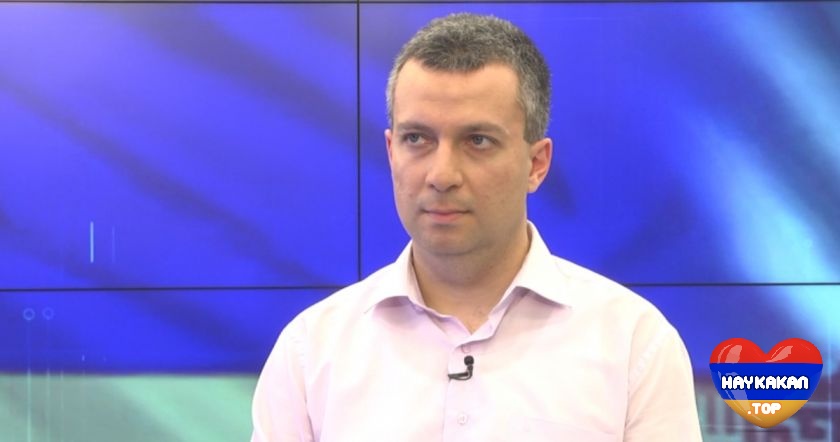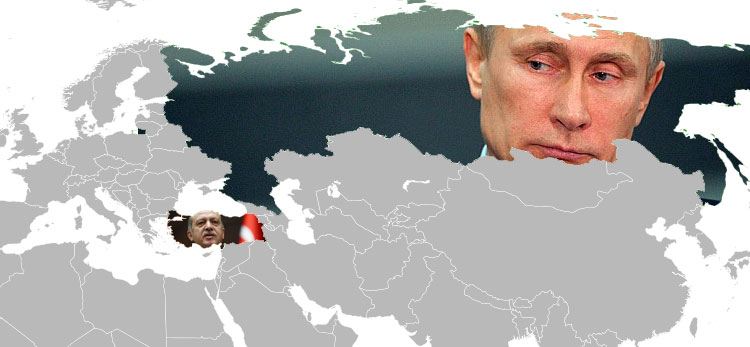In recent years Russia – Turkey relations has gone through tremendous transformations. In November 2015 two states entered the phase of acute crisis with no hope of quick improvements. However, in summer 2016 the process of reconciliation was launched which resulted in bringing unprecedent level of cooperation in economy and military-technical sphere. What are the main factors for such change and what current Russia – Turkey partnership means for the South Caucasus.
There are two key factors driving Turkey close to Russia. The absolute necessity for Turkey to prevent the establishment of autonomous Kurdish region in the Northeastern part of Syria resembling the Kurdistan Regional Government of Iraq, and the growing distrust of Turkish leadership towards the US based on the perception that Americans were somehow involved in July 2016 military coup attempt.
Since its military intervention in September 2015 Russia has gradually increased its role in Syria. All external actors involved in Syrian conundrum accept the reality – nothing can be fixed in Syria without Russian consent. Kremlin is the only power having friendly relations simultaneously with Iran, Israel, Saudi Arabia, President Assad and Turkey. Thus, cooperation with Russia in Syria is vital for Turkey to reach its key goal – to destroy the PKK linked Kurdish PYD and its military wing YPG. Since late 2016 Kurdish issue has been number one concern for Turkey in Syria replacing the five-year struggle to depose President Assad as Ankara’s absolute priority.
The 2016 July military coup attempt and US refusal to extradite Fethullah Gulen to Turkey, whom Turkish leadership and President Erdogan himself perceive as the chief mastermind behind the coup has fomented distrust towards the US. Despite President Trump seemingly personal good chemistry with President Erdogan relations are continuing to deteriorate. The US support to the Syrian Kurds in its fight against Islamic State has only exacerbated the situation. The Turkey’s decision to buy S-400 air defense system from Russia and the actual launch of deployments in mid – July put additional pressure on bilateral relations. Despite the Turkey’s efforts to avoid sanctions through personal Erdogan – Trump negotiations, the White House has officially stated that Turkey will be excluded from F-35 stealth fighter jet program.
Russia values its partnership with Turkey through both economic and political terms. Turkey is one of the biggest importers of Russian natural gas and through Turkish stream two pipelines currently under the construction Russia will use Turkish territory as a transit for gas exports to the EU. Another key bilateral economic project is 20 billion USD worth four unit 4800 MWe Akkuyu nuclear power plant. The construction was launched in April 2018 and the first unit will be operational in 2023.
The political component of relations with Turkey is based on Russian current policy to create or deepen disagreements among NATO allies and weaken the Trans-Atlantic bonds thus making Europe to feel more vulnerable in terms of security concerns. Beside this strategic goal, Russia needs better relations with Turkey to alter to its favor the military balance in the Black Sea. Despite Bulgaria’s and Romania’s accession to NATO their navies are too weak to balance or deter Russia. The key NATO asset in the region is Turkey and any deterioration in US – Turkey or/and NATO – Turkey relations definitely plays into hands of Russia.
Meanwhile, it should be emphasized that despite growing cooperation in recent years Russia and Turkey are far from being strategic partners. They have strategically different goals in Syria, and despite all contradictions concerning S-400 purchase, Turkey remains firmly anchored in NATO and even Russia’s suggestion to sell Turkey Russian SU – 35 fighter jets could do little to strategically alienate Turkey from the Alliance. No one in the alliance even thinking about Turkey’s expulsion from the Alliance and even the US is ready to continue its military cooperation with Ankara outside F-35 project. Though according to the recent polls approximately 81 percent of Turkish population sees the United States as a threat to Turkey, strategic rift between two states is unlikely. Defense partnership with the US and the membership into NATO provides Turkey with much needed hard security guarantee in a volatile region of the Middle East. It should be noted, that despite all friendly talks with Russia Turkey does not recognize Crimea as part of Russia or independence of South Ossetia and Abkhazia and had productive military cooperation with Ukraine.
The recent domestic political developments in Turkey which seriously weakened positions of President Erdogan, also does not bode well for the long-term Russia – Turkey friendly relations, which for a large extent are based on President Putin and President Erdogan personal ties. The AKP catastrophic defeat in Istanbul Mayoral re-elections and upcoming party split with AKP key members – former President Gul and former deputy Prime Minister Ali Babacan – plans to establish a new party in Autumn 2019 have a potential to seriously undermine President Erdogan’s position. The possible CHP, Good Party, HDP and Gul – Babacan party’s even temporary cooperation could create necessary conditions for snap Presidential and Parliamentary elections in late 2021 or beginning of 2022. In case of realization this scenario may bring more moderate and Pro-Western forces back into power in Turkey, which most probably will have negative impact on Russia – Turkey relations.
Meanwhile, the current Russia – Turkey cooperation has also regional implications. South Caucasus, as a field of competition between two states, is not an exclusion. Turkey’s regional policy is based on its strategic alliance with Azerbaijan, growing economic ties with Georgia and cultivating Turkey – Georgia – Azerbaijan trilateral partnership. Launched as a pure economic cooperation to facilitate the Azerbaijani oil and gas export to Europe via Georgia and Turkey, now trilateral cooperation has also political and security dimension with regular meetings of foreign and defense ministers. Turkey fully supports Azerbaijani position on Karabakh conflict and together with Baku implements the policy of pressure on Armenia including economic blockade. Another component of Turkey’s policy in the region is growing military cooperation with Azerbaijan which includes the sale of armaments, military education and trainings of Azerbaijani soldiers and officers in Turkish military universities as well as regular military drills including in Nakhijevan very close to the Armenian capital Yerevan.
As for now Turkey is satisfied with geopolitical status quo in the South Caucasus as it enjoys strategic partnership with Azerbaijan and close cooperation with Georgia, while Russia has very limited presence in Georgia and despite growing military cooperation with Azerbaijan, Baku has no intentions of joining either Collective Security Treaty Organization or Eurasian Economic Union. In this context, deepening Russia – Turkey relations are welcomed in Azerbaijan as they make for Baku easier to cultivate military cooperation with Russia simultaneously fostering its partnership with Turkey. Georgia also has no serious reasons for concerns as Russia – Turkey bromance has not changed Turkish position on Abkhazia or South Ossetia and has not brought any limitations on Turkish economic involvement in Georgia. Meanwhile, the growing Russian economic influence in Georgia especially in energy field could in the future create some possibilities for joint Russia – Turkey economic projects in Georgia including electricity export to the Turkish Eastern provinces.
As for Armenia, Russia – Turkey cooperation may have both positive and negative impact. There are growing concerns in Armenia that Russia – Turkey and Russia – Azerbaijan partnership may transform Armenia into a spoiler which creates obstacles for Russia to deepen its cooperation with both Ankara and Baku. From this perspective Russia may become to annoyed by permanent Armenian complaints regarding the sale of modern Russian armaments to Azerbaijan or Armenian concerns regarding Turkey. However, as Turkey remains competitor if not adversary for Russia in the region, the worse case scenarios for Armenia envisaging the betrayal by Russia of Armenian national interests are less likely to materialize, and not because of the fact that Russia is not able to do that but simply because it does not correspond to the Russian national interests.
Meanwhile, the growing Russia – Turkey cooperation also makes less likely of Turkish moves to strategically change the status quo in the region, including the Karabakh conflict without consulting with Russia. In this context, Turkey perhaps has become more predictable actor in the region, especially regarding its relations with Armenia or Karabakh conflict.
Summarizing we may emphasize that Turkey is not interested in the further growth of Russian influence in the South Caucasus, especially in Georgia and Azerbaijan. Given the Russian perception of the South Caucasus as a part of its legitimate interests and the vision of the region as buffer territory to prevent the penetration of Western malign influence into Russia, the strategic goals of Turkey and Russia in the South Caucasus are not compatible and the genuine partnership of Ankara and Moscow in the region is too unlikely.

Dr. Benyamin Poghosyan, Executive Director, Political Science Association of Armenia, Founder and Chairman, Center for Political and Economic Strategic Studies





